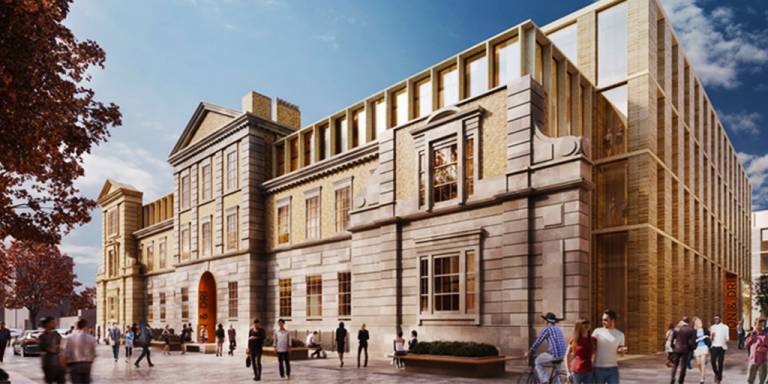£2 million Wolfson Foundation award advances world-leading new neuroscience centre at UCL
18 July 2018
The Wolfson Foundation has awarded £2 million to UCL to help create a world-leading neuroscience centre that will tackle dementia from every angle.

The state of the art new building will house UCL’s renowned Institute of Neurology, and will also be home to the research hub and national headquarters of the UK Dementia Research Institute (UK DRI) – a nationwide collaboration to revolutionise the diagnosis, treatment and prevention of neurodegenerative disorders including Alzheimer’s, Parkinson’s, Huntington’s and vascular dementia.
UCL was announced as the hub of the UK DRI in December 2016 in recognition of its world-class research. The university is home to one of the world’s largest, most productive and highest impact neuroscience centres, leading the drive to understand what causes dementia, how it develops and how it could be slowed or stopped.
The highly collaborative new neuroscience centre being created on the site of the Eastman Dental Hospital, on Grays Inn Road, will be the bedrock of the UK’s dementia effort, bringing together academia, industry, the NHS, funders and patient organisations to break down barriers and find better ways to diagnose and treat people with devastating neurological disorders.
Welcoming the award, Professor Michael Hanna, Director of the UCL Institute of Neurology, says: “Dementia is set to affect half the UK’s population. It severely affects the lives of individuals and their families, and is a huge and growing burden on health and social services. Halting it is an urgent need and having facilities that prioritise collaboration and bring researchers, clinicians and patients together is vital. Preventative treatments for dementia are in our sights, and it is visionary funders like the Wolfson Foundation that are driving progress.”
Professor Alan Thompson, Dean of the UCL Faculty of Brain Sciences, adds: “There is no neuroscience community comparable to UCL’s and nowhere else in the world is more likely to make the decisive intervention against dementia that we need. The facilities for this work really matter and having this dedicated, multidisciplinary, collaborative space will greatly accelerate the speed of dementia discovery and translation.”
UCL is also home to the Leonard Wolfson Experimental Neurology Centre, founded thanks to a £20 million award from the Wolfson Foundation in December 2011 - the largest single award the Foundation has ever made. UCL President & Provost Professor Michael Arthur says: “Over the past 30 years, we have seen significant progress in diseases such as heart disease, many cancers and HIV, where medical science has transformed treatment and outcomes. UCL is serious about driving the same shift in the case of dementia – and long-term, consistent, sustainable funding is absolutely fundamental. What the Wolfson Foundation does is transformative. It has long been a magnificent partner for UCL and we are delighted to be working hand in hand with them to tackle one of the greatest human challenges of our time.”
Paul Ramsbottom, Chief Executive of the Wolfson Foundation says, “The work that UCL is doing in dementia and related fields is both outstanding and pioneering. We are delighted to announce an award of £2 million, and to continue our funding of neurology at UCL – building on our previous investment to create the Leonard Wolfson Experimental Neurology Centre. This is a hugely ambitious project, and we are excited about the increased possibilities that this new space will open up.”
The UK DRI, launched in autumn 2017, is a £290m investment into dementia research from founding funders the Medical Research Council, Alzheimer’s Society and Alzheimer’s Research UK. The iconic new home for the Institute of Neurology and the UK DRI will be part of UCL’s redevelopment of the Eastman Dental Hospital site, which will house over 500 neuroscience researchers when completed.
The Wolfson Foundation is an independent charity that supports and promotes excellence in the fields of science, health, education and the arts and humanities.
Since it was established in 1955, over £900 million (£1.9 billion in real terms) has been awarded to more than 11,000 projects throughout the UK, all on the basis of expert review.
 Close
Close

